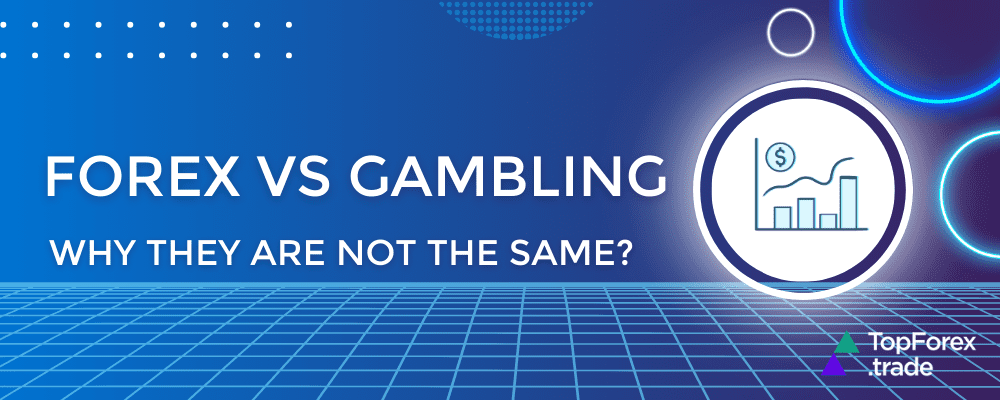Why Forex trading is not gambling: how knowledge, strategy, and reputable brokers make the difference

Have you ever wondered if Forex trading is just another form of gambling? With the thrill of high stakes and the potential for quick gains or losses, it’s easy to see why some might draw this comparison. Many people believe that trading in the foreign exchange market is nothing more than a roll of the dice, a game of chance where the odds are often stacked against you.
However, this perception couldn’t be further from the truth. Unlike gambling, Forex trading, when approached with the right knowledge, discipline, and the use of a regulated broker, is a manageable and conscious money-making activity. By treating trading as a serious endeavor and equipping oneself with the necessary tools and strategies, it’s possible to navigate the complexities of the Forex market successfully and avoid the pitfalls of gambling.
Forex trading and gambling: what is the difference?

Forex trading, or foreign exchange trading, involves the buying and selling of currencies within the global marketplace. Traders engage in this market intending to profit from the fluctuations in currency exchange rates. Unlike traditional stock markets, the Forex market operates 24 hours a day, five days a week, due to the global nature of currency exchanges.
The value of currencies in Forex trading is influenced by a variety of factors, including economic indicators such as interest rates, inflation, and employment figures, as well as geopolitical events like elections, wars, and international trade agreements. Traders use a combination of technical analysis (such as chart patterns and indicators) and fundamental analysis (evaluating economic news and events) to make informed decisions and predict market movements.
Gambling, on the other hand, is an activity in which individuals stake money on an outcome that is largely determined by chance. Common forms of gambling include games like roulette, slot machines, and lotteries, where the results are random and unpredictable. In gambling, the odds are typically set by the house or the operator, meaning the likelihood of winning is often stacked against the participant. Unlike Forex trading, gambling does not rely on skill, analysis, or strategy; instead, it is driven primarily by luck, making it inherently risky and unpredictable.
Key differences between Forex trading and gambling
Skill and knowledge requirement
Successful Forex trading is far from a game of chance; it requires a deep understanding of market dynamics, economic indicators, and global events. Traders must develop skills in Technical analysis, interpreting charts, and using indicators to predict price movements. Additionally, they need to be well-versed in Fundamental analysis, which involves assessing the impact of economic news and geopolitical events on currency values. A sound trading strategy is built on this knowledge, allowing traders to make informed decisions rather than relying on luck.
In contrast, gambling is primarily driven by chance, with outcomes that are largely beyond the participant’s control. While some games involve a degree of skill, such as poker, the majority of gambling activities—like slot machines or roulette—offer limited opportunities for the gambler to influence the outcome. The odds are typically set in favor of the house, meaning that over time, gamblers are more likely to lose money regardless of any perceived strategy or skill.
Risk management
Risk management is a cornerstone of Forex trading. Traders use various tools and strategies to protect their capital and limit potential losses. For instance, setting stop-loss orders ensures that trades are automatically closed when they reach a predetermined loss level, preventing significant financial damage. Position sizing helps traders determine the appropriate amount of capital to risk on a single trade, while diversification involves spreading investments across different currency pairs to mitigate risk.
In gambling, risk management is often minimal or non-existent. Most gamblers do not employ structured strategies to protect their stakes, and losses can quickly accumulate. The lack of a systematic approach to managing risk is one of the primary reasons why gambling is so much more dangerous financially than Forex trading. The focus in gambling is typically on the thrill of the bet rather than on preserving capital over the long term.
Control over outcome
Forex traders have a significant degree of control over their trades. They can choose when to enter or exit a position, adjust their strategies based on market conditions, and implement various analytical tools to improve their decision-making. This control allows traders to respond proactively to market changes, reducing the impact of adverse movements and maximizing profit potential.
In gambling, participants have little to no control over the outcome once the bet is placed. Whether it’s a spin of the roulette wheel or the roll of the dice, the result is entirely random and cannot be influenced by the gambler. This lack of control is a defining characteristic of gambling, making it a fundamentally different activity from Forex trading, where skill and strategy can significantly impact results.
Why people confuse FX trading with gambling

The misconception that Forex trading is akin to gambling often stems from the high-risk nature of the market and the potential for quick, significant losses. For those who are unprepared or lack the necessary knowledge and experience, trading can indeed seem like a game of chance. The volatility of the Forex market, where currency values can fluctuate rapidly within short periods, can lead to substantial financial losses if traders do not employ proper risk management techniques. Additionally, stories of individuals losing large sums of money in trading contribute to the perception that it is no different from gambling. When traders enter the market without a well-developed strategy, relying on instinct or hunches rather than informed decisions, their approach mirrors the unpredictability of gambling.
However, this comparison is flawed. As previously discussed, Forex trading is not gambling when approached with the right mindset and tools. The primary distinction lies in the role of knowledge, skill, and regulation. Successful Forex trading requires a comprehensive understanding of market dynamics, economic factors, and technical analysis. Traders who invest time in learning and applying these skills are not relying on luck but on informed decision-making.
Moreover, the use of regulated brokers adds a layer of security and transparency to Forex trading that is absent in gambling. Regulated brokers ensure fair trading practices, protect traders’ funds, and provide access to accurate market data, which helps traders make sound decisions. This regulatory framework is designed to protect traders and maintain market integrity, making Forex trading a structured and conscious money-making activity, unlike the randomness of gambling.
By focusing on continuous learning, disciplined trading strategies, and utilizing the safeguards provided by regulated brokers, Forex traders can manage risks effectively and increase their chances of long-term success. This approach differentiates Forex trading from gambling, debunking the myth that the two are the same.
Forex trading with reputable brokers: recommended list
A critical factor that separates Forex trading from gambling is the choice of a reliable and regulated broker. Partnering with a reputable broker not only ensures a secure trading environment but also provides traders with the tools, resources, and support needed to succeed in the Forex market. Brokers like XTB, NAGA, XM, OANDA, and Exness are prime examples of companies that uphold these standards, offering a range of benefits that contribute to a more structured and informed trading experience.
XTB Forex trading
XTB is a globally recognized broker known for its commitment to transparency and regulatory compliance. Offering an award-winning trading platform, XTB provides traders with advanced charting tools, technical analysis resources, and real-time market data. These features empower traders to make informed decisions based on thorough analysis, reducing the reliance on chance. Additionally, XTB’s educational resources are designed to enhance traders’ knowledge and skills, further distancing the activity from gambling.
NAGA Markets Forex trading
NAGA stands out with its innovative approach to social trading, allowing traders to follow and copy the strategies of successful investors. This feature is particularly beneficial for those new to Forex trading, as it provides an opportunity to learn from experienced traders while still maintaining control over their investments. By leveraging the expertise of others and utilizing NAGA’s comprehensive trading tools, traders can approach the market with a strategic mindset rather than a gambling mentality.
XM Forex trading
XM offers a robust trading platform with access to over 1,000 financial instruments, including Forex, commodities, and indices. What sets XM apart is its focus on client education and support, offering a wealth of webinars, tutorials, and market insights to help traders build their knowledge base. XM’s negative balance protection also ensures that traders cannot lose more than their initial investment, a safeguard that highlights the importance of risk management—something gambling lacks.
OANDA Forex trading
OANDA is a well-established broker with a strong reputation for transparency and reliability. Known for its user-friendly platform and competitive spreads, OANDA provides traders with access to a wide range of analytical tools and economic indicators. The broker’s commitment to regulatory compliance across multiple jurisdictions ensures that traders are protected and can trade with confidence. This regulated environment, combined with OANDA’s emphasis on informed trading, exemplifies the difference between Forex trading and gambling.
Exness Forex trading
Exness is renowned for its flexibility and favorable trading conditions, offering low spreads, high leverage options, and instant withdrawals. The broker’s sophisticated trading platforms come equipped with powerful analytical tools and market news feeds, allowing traders to stay informed and make strategic decisions. Exness’s dedication to client security and regulatory adherence further ensures that traders can focus on developing their skills and strategies, rather than leaving their success to chance.
Choosing to trade with reputable brokers like XTB, NAGA, XM, OANDA, and Exness plays a crucial role in transforming Forex trading from a risky venture into a disciplined, knowledge-based activity. These brokers not only provide the technical tools and market access necessary for successful trading but also offer educational resources and risk management features that empower traders to make informed decisions. By partnering with a regulated broker, traders can mitigate risks, enhance their trading strategies, and approach the Forex market with the professionalism and precision that distinguishes trading from gambling.
Related articles:
Is Forex Trading gambling? - FAQ
